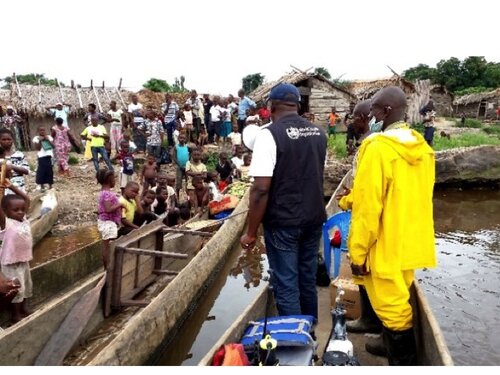Join us: Monday, 21 May 2018, 12.30 – 14.00, Room VII, Palais des Nations

71st World Health Assembly Side-event: this event is organized by Switzerland and Afghanistan and co-sponsored by The Netherlands, Nigeria, Somalia, Canada, Guinea and Central African Republic.
UHC in emergencies – a call to action
This side event on the Opening Day of the 71st World Health Assembly will raise the profile of the universal health coverage (UHC) agenda in emergencies.
The co-organizers Switzerland and Afghanistan will suggest a process for developing a concrete Call for Action. The session will include interventions including country experiences from Afghanistan, the Netherlands, Guinea, Central African Republic and Canada and a moderated expert Q & A discussion.
It is a multi-stakeholder event, bringing together Member States, the World Health Organization, the World Bank Group, UHC2030, the International Committee of the Red Cross, the International Federation of Red Cross and Red Crescent Societies, the ReBUILD Consortium and Chatham House.
Outputs from the session will be taken forward by organising partners as part of other activities to increase understanding and support operationalisation of UHC commitments in these most challenging settings.
Background:
To deliver on our commitment to the goals of universal health coverage and leaving no one behind, we must redouble efforts to expand access and improve the quality of essential lifesaving health services, without risk of financial hardship, to over a billion people affected by fragility and conflict.
This number is projected to rise to 1.9 billion by 2030. Moreover, health systems are being attacked in the very places where they are needed most, undermining any efforts to achieve UHC, producing additional fatalities, exacerbating the humanitarian case load, depriving communities access to essential care resulting in a measurable increase in mortality.
There is an urgent need for more coherent approaches to expand coverage in conflict and crisis affected situations, bringing together humanitarian and development actors to help strengthen the health system and build resilience to scale and sustain core public health capacities, whilst supporting and in some cases delivering, essential lifesaving interventions.
Despite significant normative progress on the agenda of attacks on health care, and with WHO having rolled out its Surveillance System on Attacks on Health, more still needs to be done to put the recommendations of Security Council Resolution 2286 into practice.
Photo: DRC cholera preparedness. Credit WHO / H Komerwa
